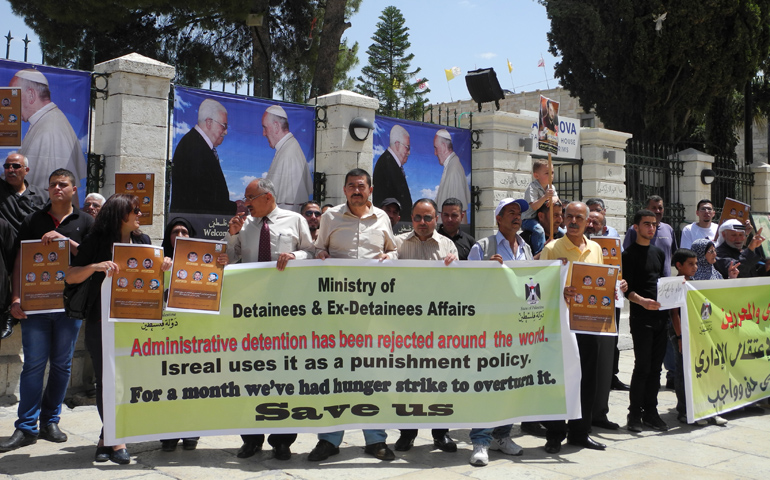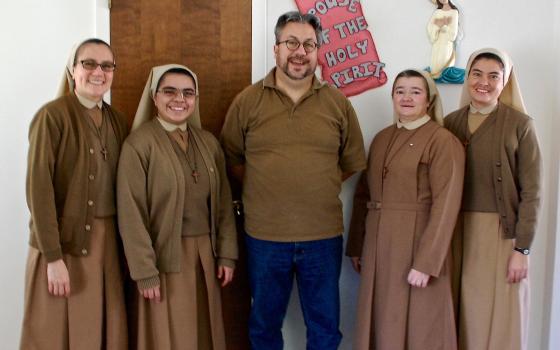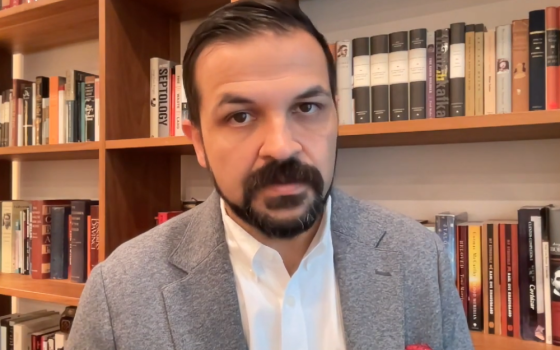
People protest Thursday in Manger Square, Bethlehem, demanding the return of Palestinians detained in Israeli prisons. Family members of those detained were among the group of about 50 protestors. (Melanie Lidman)
Palestinians hope Pope Francis will give explicit, verbal support for an independent Palestinian state when he visits Bethlehem on Sunday.
Francis is visiting Jordan, Palestine and Israel from May 24-26 as part of a trip through the Middle East, where he will visit a number of holy sites, meet political leaders from the three states, and meet with religious leaders, including Ecumenical Patriarch of Constantinople Bartholomew I, the spiritual leader of the Orthodox church.
"It's important to us that he's visiting Bethlehem and Palestine first [before Israel]," Rania Malki-Bandak, the acting director of Bethlehem Peace Center, told NCR. "He insisted on visiting Jordan, Palestine and Israel, in that order. It was a message for all Palestinians: I'm coming to visit you."
"This visit is different from all the other popes because it reflects the reconciliation of Palestine supported by the U.N. and the acknowledgment of Palestine as a state, so it is very important," Bethlehem mayor Vera Baboun said in a press conference Thursday on the final preparations for the pope's visit. Baboun referred to the November 2012 vote in the United Nations that awarded non-member observer state status to Palestine.
During his visit in Bethlehem, Francis will visit the Dheisheh Refugee Camp and pose for a photo next to the separation wall, a bitterly contested cement barrier that divides Palestinian territories from Israel that Israel says is required for security reasons. Youth from Bethlehem will also present him with a cross made from pieces of cement from the separation wall.
In 2009, Pope Benedict XVI stood near the separation wall in the Aida Refugee Camp in Bethlehem and expressed his support for an independent Palestinian state. Palestinians are hoping for a similar proclamation from Francis on Sunday, which they think will be more effective in the international arena given the new U.N. status and the popularity of the current pope.
Ekram Juha, the director of the Bethlehem mayor's office, said the preparations for this visit put more emphasis on political issues than previous papal visits, including with the decorations in Manger Square.
"There are banners of the story of Jesus from the Bible and how it's connected to the wound of Palestine," she told NCR on Thursday as workers hung the last of the banners outside. "Palestinians are asking his holiness to put his hand on this wound and examine our existence, our right to exist. Please, Francis, help make this issue clear," she said.
Francis will also meet with a number of families from Bethlehem, including refugee families and people whose family members are detained in Israeli prisons for security reasons. On Thursday, 50 family members protested in Manger Square, holding photos of their detained family members and demanding their release.
When Baboun met with Francis in June 2013 in Rome to officially invite him to Bethlehem, she pressed the pope to help deal with the problem of Palestinian detainees and prisoners.
The other issue the mayor cited as the biggest problem in Bethlehem is the high level of unemployment. Despite being a major attraction for tourists and pilgrims, the city struggles with rampant unemployment and poverty.
"Tourists come here for an hour or two and go back to Jerusalem," said Hatem Ali, who owns a falafel restaurant next to Manger Square. "With the pope's visit, nothing will change. The last pope came and nothing changed."
Tourism has the potential to be an economic boon for Bethlehem. According to the Israel Central Bureau of Statistics and the Tourism Ministry, 3.54 million visitors arrived in Israel in 2013 and injected $11.4 billion into the Israeli economy. More than half of the visitors -- 53 percent -- identified as Christian, compared with 28 percent of the visitors who identified as Jewish.
"The whole year, there are a lot of visitors," said Jack Tabash, the owner of the Bethlehem Arts Gallery on Manger Square. "Every day, there are about 100 buses. Unfortunately, the tour guides don't give them time to come and shop."
As hundreds of people waited in line to visit the Grotto of the Nativity in the church a few hundred yards away, Tabash's shop, full of religious items and souvenirs, was devoid of customers. Tabash's extended family owns many of the souvenir shops around Manger Square. The original Tabash store was opened in 1927.
Tabash told NCR that the bus tours bring many people to Bethlehem but spend so little time in the city that they have very little economic impact. "We need more people coming and more people staying in hotels in Bethlehem," he said. "They're afraid to come. They think there are problems in this country. I hear that a lot from tourists."
In addition to pressing for Palestinian statehood, Tabash said he hopes the pope will inspire more independent tourists to visit Bethlehem. "[The visit] is important for the peace and the economy of Bethlehem," he said.
Tabash also lamented the fact that the economic situation was also driving Christians to abandon their country altogether.
"[The Christian population] has been shrinking since 1948 because of the economic and political situation," he said. "Maybe if there will be peace in this country, people will stop emigrating and maybe people will come and invest money and then people can find work here. If there is no money, they'll leave to somewhere where they can make a living."
Christians in the Holy Land, including both Israel and Palestine, have dwindled from over 10 percent of the population in 1948 to between 2 and 3 percent today, according to The Associated Press. In Jerusalem, this decline is even more drastic. The Jerusalem Institute for Israel Studies (JIIS) found that Christians accounted for about 19 percent of the population before 1948 in Jerusalem, but only 1.9 percent of the population in 2012. The number of churches in Jerusalem has also declined: In the 1990s, JIIS counted 160 churches in Jerusalem, but a similar study in the early 2000s found only 117 churches.
One of the threats causing emigration among the Christian population is increasing Muslim fundamentalism in the Holy Land. This puts Palestinian Christians in a tough situation: wanting to support the Palestinian cause but sometimes feeling alienated by racism or anti-Christian behavior. Christians in Bethlehem, however, firmly identify with the Palestinian cause.
"It's because of the power games that there is racism [against Christians]," said Angie S., a coordinator at the Diyar Consortium, an ecumenical community center associated with the Lutheran church, who asked that her full name not be used. Though her Lutheran community is not celebrating the pope's visit, she is still thrilled that he will be visiting Bethlehem. "He will add to the voice of all Christians because he is a Christian figure around the world, and he does bring international attention," she said.
"We are Christians, but we are Palestinians," added Malki-Bandak of the Bethlehem Peace Center, a community center that will serve as the dressing room for Francis and his accompanying bishops and cardinals. "It's very important for the Palestinian case that we are here. This is our land."
Palestinians expressed more hope than Israelis that the visit from Francis will effect meaningful change in the ongoing conflict, perhaps because their cause has much more to gain from the pope's support.
"It's a religious visit, but we cannot take away the political side of it," said Malki-Bandak, who has helped host the previous two papal visits at the Bethlehem Peace Center. "He's meeting [Palestinian President Mahmoud] Abbas and Israeli figures, so that says it's going to be a political issue."
"Will it bring change?" Malki-Bandak asked. "We hope. We have to be optimistic or else we couldn't live here. It's in God's hands."
[Melanie Lidman is a freelance journalist in Israel.]



